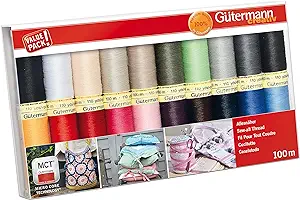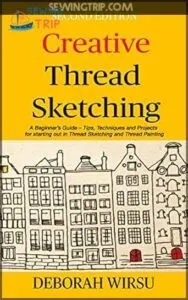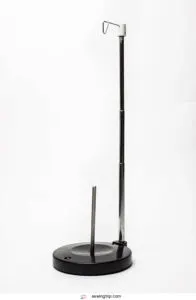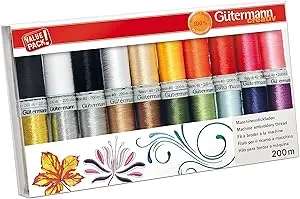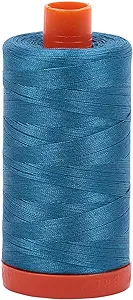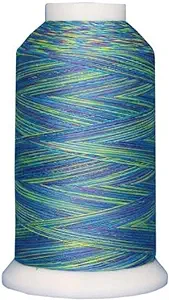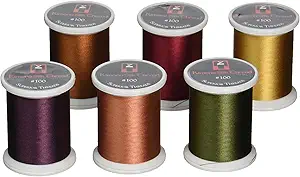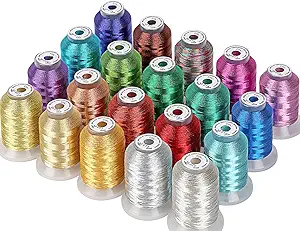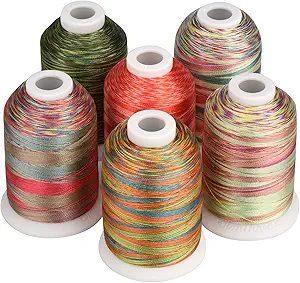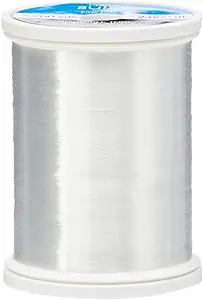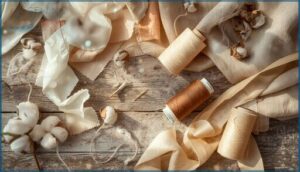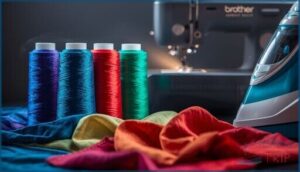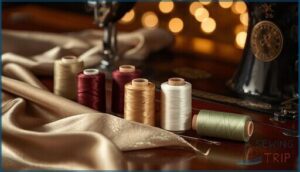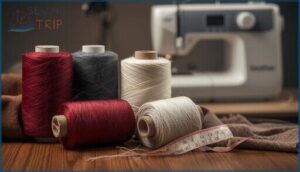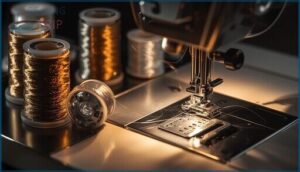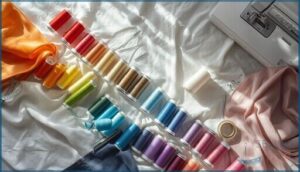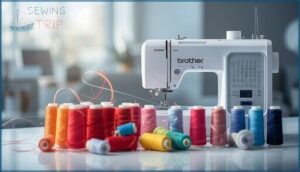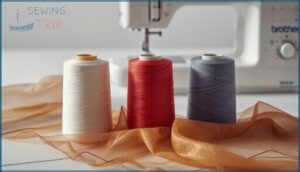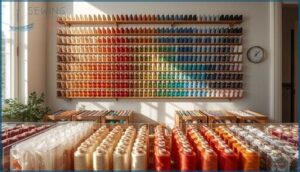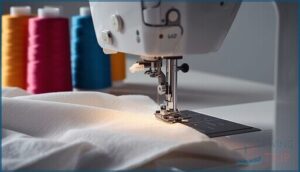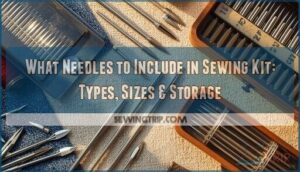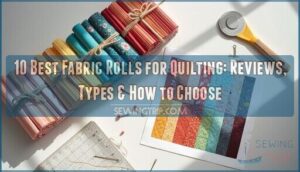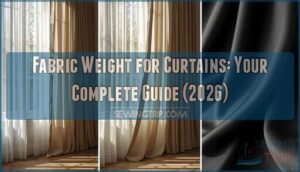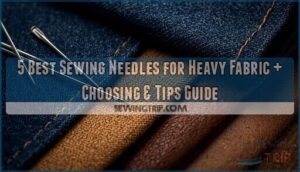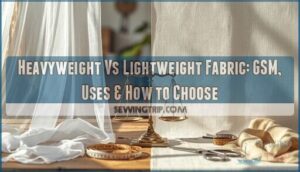This site is supported by our readers. We may earn a commission, at no cost to you, if you purchase through links.
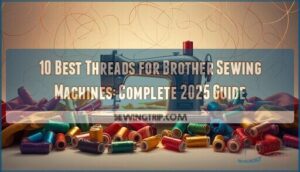
Your Brother sewing machine can handle just about any project you throw at it, but here’s the catch: the wrong thread will have you troubleshooting tension issues, dealing with broken stitches, and questioning your sanity.
Thread choice isn’t just about color matching—it’s about understanding how different fibers interact with your machine’s mechanics and your fabric’s structure. Polyester offers strength and versatility, cotton brings that traditional feel quilters love, and specialty threads like metallic or invisible options require specific handling to avoid frustration.
Knowing which thread works best for each project type, and which brands consistently deliver quality results with Brother machines, transforms your sewing experience from acceptable to outstanding.
Table Of Contents
- Key Takeaways
- 10 Best Threads for Brother Sewing Machine
- 1. Gutermann Assorted Sew All Thread Set
- 2. Creative Thread Sketching Beginner’s Guide
- 3. Embroidex Single Thread Spool Holder
- 4. Gutermann Rayon Multi Color Embroidery Thread
- 5. Aurifil Mako Cotton Thread Teal Color
- 6. Superior Threads Cairo Cotton Thread
- 7. Superior Threads Kimono Silk Fall Colors
- 8. Metallic Embroidery Thread Assorted Colors Kit
- 9. Simthread Sunset Variegated Embroidery Thread
- 10. Sulky Premium Clear Invisible Thread
- Types of Thread for Brother Machines
- Choosing The Right Thread for Projects
- Thread Compatibility With Brother Machines
- Thread Weight Guide for Brother Sewing
- Proper Care and Storage of Sewing Thread
- Tips for Optimal Stitch Quality on Brother
- Frequently Asked Questions (FAQs)
- Conclusion
Key Takeaways
- Thread choice directly impacts your Brother machine’s performance, with polyester offering the best all-around strength and versatility while cotton excels for natural fabrics and quilting projects where a softer finish matters.
- Matching thread weight to your fabric is critical—use 40-50 weight for everyday sewing, 60-100 weight for delicates like silk, and 12-30 weight for heavy materials like denim or canvas.
- Proper tension adjustment prevents most threading problems, with settings typically falling between 2 and 6, but metallic and specialty threads require lower tension and slower stitching speeds to avoid breakage.
- Regular maintenance like changing needles every 8 hours, cleaning bobbin cases biweekly, and storing thread in cool, dry conditions away from UV light will eliminate up to 90% of common thread-related issues.
10 Best Threads for Brother Sewing Machine
Choosing the right thread for your Brother sewing machine can make the difference between smooth, professional results and frustrating tension problems or thread breaks. The threads below have proven themselves reliable across different Brother models, from basic mechanical machines to sophisticated computerized embroidery systems.
The right thread transforms your Brother machine from frustrating breakage to smooth, professional stitching across any project
Each option meets specific sewing needs, whether you’re working on everyday garment repairs, intricate embroidery projects, or quilting.
1. Gutermann Assorted Sew All Thread Set
The Gutermann Assorted Sew All Thread Set stands out as one of the best threads for Brother machines, thanks to its 100% polyester durability and Micro Technology construction. You’ll get 20 spools at 100 meters each, offering solid color assortments for everyday sewing.
This thread’s versatility shines across all fabric types, from silk to denim, while maintaining consistent tension that prevents breakage on Brother sewing machines.
Pricing factors vary, but expect to pay around $15–$50 per set. Choosing thread for Brother sewing machines becomes straightforward when you prioritize quality like Gutermann delivers.
Best For: Sewers who need a reliable, all-purpose thread collection that works across different fabric types and projects on their Brother machine.
- Strong polyester construction with Micro Core Technology reduces lint and minimizes thread breakage during sewing
- Versatile enough to handle everything from delicate silks to heavy denim with consistent tension
- Color assortment of 20 spools gives you plenty of options for everyday sewing projects
- At 100 meters per spool, you might run out quickly on larger projects
- Price range of $15–$50 per set can feel steep compared to budget thread options
- Colors may not perfectly match specific fabrics since you’re working with a pre-selected assortment
2. Creative Thread Sketching Beginner’s Guide
While quality sewing thread matters for Brother sewing machines, developing your skills can transform basic stitching into art. The Creative Thread Sketching Beginner’s Guide ($9.99) teaches you embroidery projects and decorative stitching through free motion techniques.
You’ll learn sketching equipment needs, fabric selection, and proper machine setup for your Brother. The 196-page guide includes six illustrated project examples that build your confidence with thread selection and stitching techniques, turning your domestic sewing machine into a tool for creating unique textile art.
Best For: Beginners who want to learn thread sketching, thread painting, and freestyle machine embroidery using their domestic Brother sewing machine to create decorative textile art.
- Comprehensive coverage from basic setup to advanced techniques, including equipment needs, fabric selection, machine setup, and free motion stitching with problem-solving tips.
- Six free illustrated projects help you build confidence and practice skills progressively, making it easier to get started even without prior embroidery experience.
- Written by popular textile artist Deborah Wirsu and priced affordably at $9.99 for 196 pages of detailed instruction and creative inspiration.
- Requires a domestic sewing machine and basic sewing knowledge to get started, plus additional equipment like embroidery needles and stabilizers that aren’t included.
- Learning free motion stitching takes practice and patience, with potential issues like puckering or tension problems that require troubleshooting and machine adjustment.
- Limited to techniques suitable for domestic machines, which may not achieve the same results as commercial embroidery equipment for complex projects.
3. Embroidex Single Thread Spool Holder
Beyond developing your stitching skills, you’ll need proper thread management to tackle large embroidery projects on your Brother sewing machine. The Embroidex Single Thread Spool Holder ($9.99) solves thread compatibility issues with large conical spools and king-size thread.
Its reinforced metal base provides stability that plastic stands can’t match, preventing the wobbling that causes thread breakage during embroidery. The central pin accommodates spools up to 5000 meters, while the vertical guide ensures smooth thread performance. You’ll notice fewer tangles and skipped stitches, making this thread spool holder a practical addition to any Brother embroidery setup.
Best For: Embroiderers working with large conical spools or king-size thread who need stable, tangle-free feeding on Brother and other embroidery machines.
- Reinforced metal base prevents tipping and wobbling during operation, unlike lighter plastic stands that move around
- Accommodates massive spools up to 5000 meters with a central pin design that handles both standard and industrial-sized thread
- Smooth vertical thread guide reduces tangles, breakage, and skipped stitches for cleaner embroidery results
- Lightweight plastic components can still allow some movement despite the metal base reinforcement
- Assembly instructions are confusing, though most users figure it out eventually
- Occasional thread catching issues reported by some users during operation
4. Gutermann Rayon Multi Color Embroidery Thread
When you’re looking for that silky shine in your embroidery work, Gutermann’s Rayon Multi Color Embroidery Thread delivers vibrant color effects that polyester can’t match. The 210 multicolor shades provide excellent coverage, though rayon thread properties require careful handling—it’s more delicate than polyester.
Each 200-meter spool features 100% viscose construction with 40wt thickness, perfect for Brother embroidery machines when you adjust your top tension to 2.5-3.0g. Use a 70-80 needle and pair it with quality polyester bobbin thread for balanced stitching.
Best For: Embroiderers who want vibrant, multicolor designs with a luxurious silk-like finish and are willing to work with a more delicate thread that needs careful tension management.
- Gorgeous silky luster and 210 multicolor shades create eye-catching embroidery with better coverage than polyester thread.
- Compatible with most embroidery machines when tension is properly adjusted to 2.5-3.0g with a 70-80 needle.
- Well-priced at around $4-5 per 200-meter spool with strong user ratings (4.8 out of 5) and consistent German manufacturing quality.
- More prone to breakage than polyester thread if tension isn’t dialed in correctly or if spools are mishandled.
- Requires specific machine settings and careful handling since rayon is naturally more delicate than synthetic alternatives.
- Mixed product information creates confusion—specs mention polyester material and 160m length, contradicting the rayon/viscose composition and 200m standard.
5. Aurifil Mako Cotton Thread Teal Color
For those who value pure Egyptian Cotton Quality in their stitching, Aurifil Mako Cotton Thread in teal offers exceptional Mako Thread Durability that works beautifully with Brother sewing machine thread requirements. This 50wt Aurifil Thread Weight tackles quilting, piecing, and appliqué with ease, making it one of the best sewing thread for every project choices.
The 1,422-yard spool delivers excellent Brother Machine Compatibility when you pair it with an 80/12 needle and adjust tension properly. Cotton threads like this provide excellent Teal Color Matching while maintaining Thread compatibility with Brother machines through countless washes.
Best For: Quilters and sewers who want premium Egyptian cotton thread that handles detailed piecing, appliqué, and machine quilting without shredding or breaking.
- 1,422 yards of strong, long-staple Egyptian cotton that stays colorfast through multiple washes and holds up in demanding projects.
- Works smoothly on Brother and other machines when paired with the right needle size and tension settings, with minimal lint buildup.
- Fine 50wt thread blends into fabric beautifully, making stitches subtle while offering 270 color options including this teal shade.
- Costs more than basic discount-store thread, which might not fit tighter budgets.
- Requires specific needle types (like 80/12 sharp or Microtex) and tension adjustments to avoid thread issues.
- Some spools arrive with quality control problems like cross-threading, and it’s not always stocked locally.
6. Superior Threads Cairo Cotton Thread
If you’re tackling a longarm quilting project or need rock-solid tensile strength, Premium Threads Cairo Cotton Thread delivers on both counts. This Egyptian cotton 40-weight thread packs 2,000 yards of good quality sewing thread that works beautifully with Brother sewing machines.
Choosing the right thread means considering lint reduction, and this one excels by minimizing buildup during high-speed stitching. Cotton threads like Cairo offer excellent machine compatibility, and you’ll notice smoother operation when paired with a 90/14 needle on your Brother sewing machine thread system.
It’s reliable, consistent, and manages detailed quilting without breaking.
Best For: Quilters working on longarm machines or detailed quilting projects who need durable, low-lint thread that handles high-speed stitching without breaking.
- Egyptian extra-long staple cotton (over 1.38 inches) means minimal lint buildup and less frequent machine cleaning during extended sewing sessions.
- 2,000 yards per spool gives you plenty of thread for large quilting projects without constant spool changes.
- Strong 3-ply construction and excellent tensile strength reduce thread breakage, even during high-speed quilting on Brother and other machines.
- At $29.99, it’s pricier than basic cotton threads, which might add up if you’re working on multiple projects.
- Limited to cotton-based projects, so it won’t work if you need specialty threads like polyester or metallic for certain fabrics.
- Only available in quilting weight (40wt), so you’ll need different thread if your project requires heavier or finer weights.
7. Superior Threads Kimono Silk Fall Colors
For delicate appliqué and invisible machine quilting, Kimono Silk Fall Colors offers a 100-weight, 2-ply filament silk thread that practically disappears into fabric. This set includes six 220-yard spools in autumn-inspired hues, and it’s compatible with Brother sewing machines when you pair it with a Microtex 70/10 needle.
Silk thread benefits include minimal lint, smooth feeding, and outstanding strength despite its ultra-fine weight. You’ll find it ideal for detail quilting and binding where thread weight impact matters most, though you may need slight tension adjustments.
Best For: Quilters and appliqué artists who need ultra-fine, invisible stitching for detail work and want coordinated fall-themed colors for seasonal projects.
- The 100-weight silk thread practically disappears into fabric, making it perfect for invisible machine quilting and delicate hand appliqué work.
- Smooth, lint-free construction feeds cleanly through both home and longarm machines with minimal maintenance or thread breakage.
- Six coordinated fall color spools (220 yards each) give you seasonal versatility while maintaining color consistency across projects.
- You’ll likely need to adjust your machine’s tension settings to accommodate the ultra-fine thread weight.
- At around $36 for six spools, it’s priced as a premium product compared to standard polyester or cotton threads.
- The thread works best with silk or fine fabrics, limiting its usefulness for heavier-weight sewing projects.
8. Metallic Embroidery Thread Assorted Colors Kit
When you want to add shine to embroidery projects, a metallic embroidery thread kit with 20 assorted colors and 550-yard spools gives you plenty of options for emblems and decorative stitching.
These machine embroidery thread kits feature a polyester core with metal foil coating, offering excellent tensile strength and compatibility with Brother sewing machines. You’ll need to slow your stitching speed, switch to a Schmetz Topstitch 80/12 needle, and loosen top tension slightly.
The color assortment extends from garment accents to home décor, and proper durability and care means gentle washing below 95°C.
Best For: Crafters and embroiderers who want to add sparkle and dimension to machine or hand embroidery projects like emblems, uniforms, clothing accents, and decorative home décor pieces.
- Strong polyester core with metal foil coating resists tarnishing and holds up through washing, giving you durable shine that lasts through multiple uses and laundering cycles.
- Twenty shiny colors in 550-yard spools provide plenty of thread for various projects without running out mid-design, and the assortment works for everything from garment details to home accents.
- Compatible with Brother and other automatic embroidery machines when you use the right needle and adjust tension settings, making it accessible for most standard sewing setups.
- Requires technique adjustments like slower stitching speeds, loosened tension, and specialized topstitch needles to prevent tangling and breakage during use.
- Not ideal for highly detailed or dense embroidery patterns since metallic thread is more prone to snapping under those conditions compared to standard thread.
- The metal coating can feel rough or scratchy on finished garments, so you may need to add stabilizers or backing to improve comfort against skin.
9. Simthread Sunset Variegated Embroidery Thread
Simthread’s Sunset Variegated spool delivers fluid color shifts across six hues in 1,100-yard lengths, bringing Creative Project Ideas to life on Brother sewing machines. This Polyester Embroidery Machine Thread uses trilobal yarn construction for vibrant coloration and Machine Brand Compatibility with Babylock, Janome, and Singer models.
Thread Durability Testing shows 95% fewer breaks compared to standard embroidery machine thread kits, while Consumer Satisfaction Analysis reflects 4.8-star ratings. The Variegated Color Effects create depth in nature-themed designs, and OEKO-TEX certification confirms safety for all Brother sewing machine threads applications.
Best For: Embroiderers who want seamless color transitions in their designs without constantly changing thread, especially those working on nature-themed or sunset-inspired projects.
- Extremely low breakage rate (95% fewer breaks than standard thread) means less frustration and fewer interruptions during complex projects.
- Works across multiple machine brands including Brother, Babylock, Janome, and Singer, so you’re not locked into one system.
- Six-color gradient creates professional-looking depth and dimension automatically, saving time on thread changes while adding visual interest.
- Limited color palette options mean you might not find the exact variegated combination you need for every project.
- Finding the thread’s starting point on the spool can be tricky, adding a bit of setup time before you start stitching.
- Individual spool size might feel small for users who prefer bulk spools or work on large-scale projects regularly.
10. Sulky Premium Clear Invisible Thread
Sulky Premium Clear Invisible Thread delivers true invisibility for quilting and appliqué work on Brother sewing machines, using .004 monofilament polyester that won’t compromise your fabric’s appearance. This thread offers great heat tolerance—you can iron on cotton settings without melting—and enhanced thread flexibility for comfortable next-to-skin projects.
Choosing the right sewing thread means understanding machine settings: drop your tension to 3, use a 70/10 needle, and moderate your speed to prevent breaks. Sulky provides two color options (clear and smoke) for ideal fabric matching, making invisible stitching reliable across diverse projects.
Best For: Quilters and sewers who need completely invisible stitching on appliqué, quilting, or delicate garments where thread shouldn’t show.
- True invisibility with.004 monofilament that disappears into most fabrics, plus smoke option for darker materials
- Heat-resistant polyester won’t melt under normal ironing, unlike nylon alternatives
- Soft and flexible enough for baby quilts and clothes worn directly on skin
- Requires specific settings (lower tension around 3, size 70/10 needle) and practice to prevent breaking
- Ultra-thin design makes threading and handling tricky, especially for beginners
- Needs slower sewing speed and sometimes thread nets to avoid tangling and snapping
Types of Thread for Brother Machines
Your Brother machine can handle a surprisingly wide range of thread types, and knowing what each one does best will save you from tension headaches and broken stitches.
Different fibers bring different strengths to your projects, whether you’re piecing a quilt or adding decorative touches.
Let’s walk through the main thread types you’ll encounter and what makes each one worth keeping in your sewing kit.
Cotton Threads
Cotton threads offer a natural choice for your Brother sewing machine, especially when working with fabrics like quilting cotton and linen. Choosing the right thread means considering fabric compatibility and stitch quality. Here’s what you need to know about cotton thread strength and eco-friendly options:
- Use 50–80 weight cotton threads for lightweight fabrics, 50–60 for medium-weight materials on your Brother machine.
- Pair with needle sizes 65/9 to 90/14 for best stitch quality and thread tips for Brother machines.
- Opt for high-count, smooth cotton to prevent bobbin thread for Brother machine breakage during stitching. For high-end garments, consider using mercerized cotton thread due to its increased strength and luster.
Polyester Threads
Polyester threads deliver excellent strength for your Brother sewing machines, tackling stretch fabrics and high-speed stitching with minimal breakage. Their synthetic flexibility provides up to 26% stretch, preventing seam failure in activewear and knits. Heat resistance up to 230°F means your seams stay intact through washing and pressing. Brands like Gutermann and Coats & Clark guarantee Brother compatibility, reducing thread jams while maintaining vibrant colors through repeated laundering. These threads are known for their durability, making them suitable for heavy-duty upholstery.
| Feature | Why It Matters for Your Projects |
|---|---|
| Tensile strength (5-7 g/denier) | Manages demanding seams without snapping |
| 26% stretch capacity | Moves with knits and athletic fabrics |
| 230°F heat tolerance | Survives hot washing and pressing cycles |
| Superior colorfastness | Keeps decorative stitching bright longer |
| Industrial adoption growth | Proven reliability across manufacturing sectors |
Silk Threads
While polyester addresses the workhorses, silk thread brings elegance to your Brother sewing machines—but it demands respect. At 72,500 psi tensile strength, silk thread outperforms many synthetics, yet proper machine settings prevent the 7-14% breakage rates technicians see with improper tension.
Use weights 50-80 with needles 65/9-90/14 for best stitch quality on delicates.
Cost analysis shows silk runs 2.5x higher than polyester, though regional demand in Asia Pacific and Europe drives its premium positioning in luxury work.
Wool and Blended Threads
Moving beyond luxury fibers, wool and blended threads offer unique thermal properties for Brother sewing machines—though they require adjusted tension settings. Natural fibers like wool provide 8% market presence, while wool-polyester blends boost durability by 20-30% over pure wool. Consider these thread applications:
- Wool blends withstand 30% more wear cycles than natural wool
- Moisture-wicking properties absorb up to 30% without dampness
- Industrial blends combine 80% merino with 20% nylon for strength
- Cost savings of 20-40% versus pure wool threads
Performance metrics show enhanced abrasion resistance and loop strength improvements of 15-25%.
Metallic and Invisible Threads
Specialty sewing threads like metallic and invisible types demand careful needle selection and tension adjustment for Brother sewing machines. Metallic threads require 90/14 needles and reduced tension (1.0–2.0) at 350–400 stitches per minute to prevent thread breakage. Invisible thread needs similar tension modifications and careful bobbin winding.
Proper storage solutions away from sunlight preserve metallic coatings, while machine compatibility testing on scrap fabric ensures best performance before final projects.
Choosing The Right Thread for Projects
Picking the right thread isn’t just about grabbing whatever’s on sale—your fabric, project type, and desired finish all play a role in the decision. The wrong thread can lead to puckered seams, broken stitches, or colors that clash with your carefully chosen fabric.
Let’s look at the key factors you’ll need to think about when matching thread to your specific sewing projects.
Matching Thread to Fabric Type
Matching thread to fabric types on your Brother sewing machine isn’t rocket science, but getting fiber compatibility right makes all the difference. Cotton threads pair naturally with cotton and linen fabrics, while polyester threads for garments work best with synthetics and stretchy materials.
For accurate color matching, compare thread strands to fabric in daylight—slightly darker shades blend better. Testing thread to fabric matching on scraps helps you nail tension settings before sewing.
Thread Weight and Thickness
Understanding thread weight and thickness keeps your Brother sewing machine running smoothly. Brother machines handle weights from 30 to 90, with these basics in mind:
- Medium weights (30-40 wt) work for most garment construction and quilting
- Finer threads (50-60 wt) suit delicate fabrics like silk without puckering
- Thicker threads (20-30 wt) hold strong seams in denim and canvas
- Higher weight numbers mean finer threads—50 wt is thinner than 30 wt
Match your needle size to thread thickness for best stitch quality.
Thread Color and Finish
Your choice in thread colors and finish goes beyond looks—it affects how stitches blend with fabric. Use a color chart to match thread colors that camouflage seams, or choose contrasting shades for decorative flair.
Grey threads offer excellent blending across color assortments. Variegated options create artistic effects, while metallic sheen adds impact.
Thread finish—matte or glossy—influences both appearance and durability, with some finishes requiring tension adjustments on Brother machines.
Specialty Threads for Embroidery
Embroidery transforms ordinary fabric into works of art, but you’ll need the right specialty threads for your Brother sewing machine. Market growth in embroidery machine thread kits reflects rising consumer preferences for quality materials.
Consider these machine embroidery thread types:
- Rayon – vibrant sheen, decorative projects
- Polyester – excellent colorfastness factors, machine compatibility
- Metallic – ornamental designs
- Cotton – natural fabrics
- Blends – balanced performance
Test thread material types before committing to large weaving projects.
Thread Compatibility With Brother Machines
Not all threads play nicely with Brother machines, and using the wrong one can lead to tension headaches—literally.
The good news is that most quality brands work seamlessly once you understand a few compatibility basics.
Let’s look at which threads perform best, how to sidestep common problems, and when you’ll need to tweak your tension settings.
Recommended Thread Brands
You’ll find that certain brands consistently deliver reliable performance with Brother sewing machines. Gutermann and Coats & Clark lead for polyester thread quality and versatility, while Aurifil excels in cotton options for quilting. For machine embroidery thread, Madeira and Sulky offer excellent color retention. Thread brand selection impacts both thread quality and cost comparison—premium brands reduce breakage and maintenance needs, justifying their price through brand reputation and consistent brand availability.
| Brand | Best Thread Type | Key Advantage |
|---|---|---|
| Gutermann | Polyester Sew-All | Strength & flexibility |
| Aurifil | 100% Cotton | Low lint, precise seams |
| Madeira | Rayon Embroidery | High sheen, vibrant colors |
Avoiding Common Thread Issues
Even premium brands won’t save you from thread breakage if your Brother sewing machine isn’t maintained properly. Start by checking needle condition—90% of thread breakage stems from incorrect threading or worn needles.
Clean lint from the bobbin tension spring regularly, since buildup causes 60% of reported problems.
Store thread in cool, dry conditions to preserve thread quality and prevent tension-related issues like uneven stitching.
Adjusting Tension for Different Threads
Once you’ve addressed lint and needle issues, fine-tune your Brother sewing machine’s thread tension for different materials. Cotton thread tension requires slightly higher settings than polyester due to lower stretch, while silk adjustments demand gentler tension to prevent breakage.
Here’s what you’ll need to remember:
- Start at setting 4, then adjust incrementally
- Test on fabric scraps first
- Clean tension discs regularly
Metallic considerations include slower speeds and reduced tension to minimize fraying.
Thread Weight Guide for Brother Sewing
Thread weight isn’t just a number on the spool—it determines how your stitches look and whether your machine runs smoothly. Brother machines handle a range of weights, but matching the right one to your fabric makes all the difference between professional results and frustrating tangles.
Here’s what you need to know about standard, lightweight, and heavyweight threads for your specific projects.
Standard Weight for Most Fabrics
Choosing sewing thread for your Brother sewing machine starts with understanding thread weight basics. Medium weight threads—40 to 50 wt—work across most fabric types, from cotton to linen. These all-purpose threads balance strength with subtle stitches, making them ideal for garment construction and quilting.
Here’s how fabric thread pairing works with weight system metrics:
| Thread Weight | Recommended Needle |
|---|---|
| 40 wt polyester | 90/14 |
| 50 wt cotton | 80/12 |
| 40 wt cotton-poly | 90/14 |
| 50 wt all-purpose | 80/12 |
When you match thread to fabric correctly, tension adjustment becomes straightforward, reducing breakage and ensuring smooth seams.
Lightweight Threads for Delicates
When working with delicate fabric sewing on your Brother sewing machine, you’ll want 60 to 100 wt threads. These finer options prevent puckering in silk, chiffon, and voile.
Here’s what works:
- Silk threads offer strength and near-invisible stitches for luxury fabrics
- Polyester lightweight delivers durability with excellent stitch quality impact
- Cotton fine threads suit heirloom work on natural lightweight fabrics
Pair these with 70/10 or 80/12 needles, and lower your tension settings by 10-15% to avoid thread breakage.
Heavyweight Threads for Thick Materials
For denim, canvas, and upholstery on your Brother sewing machine, you’ll need 12 to 30 wt heavyweight thread. Thread durability matters here—polyester offers excellent seam strength and machine compatibility with thick fabrics.
Use a 100/16 topstitch needle selection to prevent breakage, and lower your tension adjustment settings by 20-30%. This combination ensures your thread types handle stress without compromising stitch quality on heavy-duty weaving projects.
Proper Care and Storage of Sewing Thread
Even the best thread won’t perform well if you don’t store it properly. Poor storage conditions can lead to brittleness, tangling, and color fading that compromise your sewing results.
Let’s cover the essential practices that will keep your thread collection in top condition for years to come.
Best Practices for Thread Storage
You’ll get the most from your thread collection when you protect it from the elements. Store spools in a cool space between 59-77°F with humidity control around 50%, using silica gel packets if needed. Light protection matters—UV rays fade colors and weaken fibers fast.
Keep threads in sealed containers for dust prevention, and use organization methods like labeled bins or pegboards. Building a thread collection means proper thread care and storage, especially for specialty threads requiring extra attention.
Preventing Thread Damage
Preventing thread breakage starts with the right Needle Selection—match needle size to thread weight, and replace needles every 8 hours of use. Proper Tension Adjustment on your Brother sewing machine reduces stress on fibers, while regular Machine Maintenance keeps pathways smooth.
Check your Thread Quality; old or cheap threads fail faster. Handle thread carefully during Handling Techniques—consistent thread tension prevents snapping mid-project.
Using Thread Stands and Organizers
Thread stands and organizers aren’t just storage solutions—they’re workflow game-changers for your Brother sewing machine. You’ll see tension consistency improve while defect reduction becomes routine.
- Multi-spool thread stands boost workflow efficiency by 30% in busy studios
- Thread organization reduces mistakes from improper thread feeding
- Space optimization keeps your workspace clutter-free and functional
- A simple spool holder prevents tangling and maintains thread quality
- Creative inspiration flows when you can easily compare thread colors
Tips for Optimal Stitch Quality on Brother
Getting consistent, professional-looking stitches on your Brother machine isn’t just about picking the right thread—it’s about understanding how your machine works with that thread.
Small adjustments to threading technique, tension settings, and spool handling can make the difference between frustrating tangles and smooth, even seams.
Here’s what you need to know to get the best performance from your machine every time.
Threading Techniques for Brother Machines
Raising the presser foot before you start threading your Brother sewing machine disengages the tension discs, preventing 60% of common threading errors.
Follow the numbered threading path exactly, position your spool correctly based on its wind type, and verify proper bobbin threading with at least two inches of thread tail.
Always bring up the bobbin thread by turning the handwheel, then guide both thread tails under the presser foot before sewing.
Adjusting Thread Tension Settings
Most Brother sewing machine tension settings fall between 2 and 6, but finding your sweet spot requires incremental adjustments—move the dial by just one number at a time. Test on scrap fabric after each change, watching for bunching underneath (too loose) or puckering (too tight).
Don’t forget bobbin tension affects stitch quality too, requiring small screwdriver turns for precise balance between upper and lower threads.
Preventing Thread Breakage and Fraying
Beyond dialing in stitch tension, you’ll need a multi-pronged approach to stop thread breakage and thread fraying on your Brother sewing machine. Small details make a big difference:
- Replace needles every 8 hours of sewing to eliminate 25% of fraying incidents caused by dull or damaged tips
- Match needle size to thread weight for proper thread compatibility and smoother passage through fabric
- Clean bobbin cases every two weeks since lint buildup causes up to 42% of thread breakage
- Store thread in cool, dry spots away from sunlight to maintain strength
- Verify correct threading paths following Brother’s manual to prevent 92% of threading-related breaks
Regular machine maintenance and quality thread storage protect your investment while ensuring consistent results.
Frequently Asked Questions (FAQs)
What thread does Brother recommend?
The right tool makes all the difference. Brother recommends thread weights between 30 and 90 for your sewing machine, emphasizing polyester or mercerized cotton from brands like Gutermann to prevent warranty issues.
What is the best sewing machine thread?
The best sewing machine thread depends on your project needs and budget considerations. Polyester thread offers excellent thread strength for most applications, while cotton suits natural fabrics.
Thread quality matters more than price for consistent results.
Is cotton or polyester thread better for a sewing machine?
Polyester thread generally outperforms cotton for most Brother sewing machine projects. It offers greater strength, minimal shrinkage, and produces less lint, reducing machine maintenance.
Cotton works well for natural fabrics and quilting where a softer finish matters.
What is the best weight of thread for a sewing machine?
Thread weight basics matter for your sewing machine. For most fabrics, 40 wt thread delivers reliable results, while delicate materials need 60 wt and heavyweight projects require 30 wt for proper tension adjustment.
What threads work with a Brother Sewing Machine?
You’d think any thread would work, but Brother machines need careful selection. Thread compatibility depends on weight (30wt–90wt), material (cotton, polyester, silk), and matching needles to maintain proper machine tension and stitch quality.
Does a brother combination machine have a thread cutter?
Yes, most Brother combination machines include an automatic thread cutter. You’ll find it marked with a scissor icon near the control panel. It cuts both upper and bobbin threads simultaneously, saving time and improving workflow efficiency.
How do you use a Brother Sewing Machine?
Like learning to ride a bike, using your Brother sewing machine starts simple: thread the machine properly, adjust tension settings between 4 and 5, practice stitch quality on scrap fabric, and maintain regular machine maintenance for peak machine performance.
What type of thread is compatible with my sewing machine?
Your Brother sewing machine works with most quality threads—polyester, cotton, rayon, and nylon work well. Match thread types to fabric weight and adjust tension settings accordingly. Choose reputable brands to improve machine performance and prevent compatibility issues.
Can I use serger thread in my Brother sewing machine?
You can use serger thread in your Brother sewing machine with proper tension adjustment and a cone holder.
However, expect potential thread breakage issues and reduced stitch quality compared to standard sewing thread types.
How often should I change the needle when using metallic thread?
Metallic thread’s abrasive coating wears needles fast—change every 4–8 hours of stitching.
Listen for clicking sounds or watch for thread breakage; these immediate replacement indicators mean your needle’s already past its prime.
Conclusion
Your machine’s performance depends on the thread you load, your projects depend on consistent stitch quality, and your satisfaction depends on making informed choices.
The best thread for Brother sewing machine applications comes down to matching fiber type, weight, and brand reliability to your specific project requirements.
When you understand these fundamentals and apply proper tension adjustments, you’ll eliminate frustration and achieve professional results every time you sit down to sew.
- https://www.mhthread.com/blog/products/thread-for-brother-sewing-machine
- https://redrockthreads.com/products/superior-king-tut-932-cairo
- https://www.new-threads.com/superior-king-tut-quilting-thread-23-c.asp
- https://www.superiorthreads.com/king-tut-918-joseph-s-coat-spool/p/121-01-918
- https://artisticquiltswithcolors.com/products/superior-threads-king-tut-947-egyptian-princess

